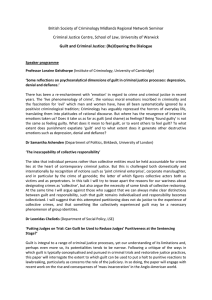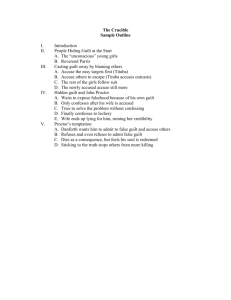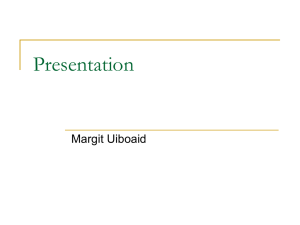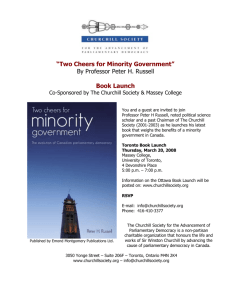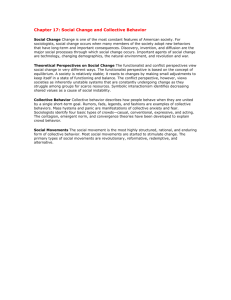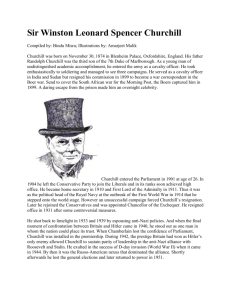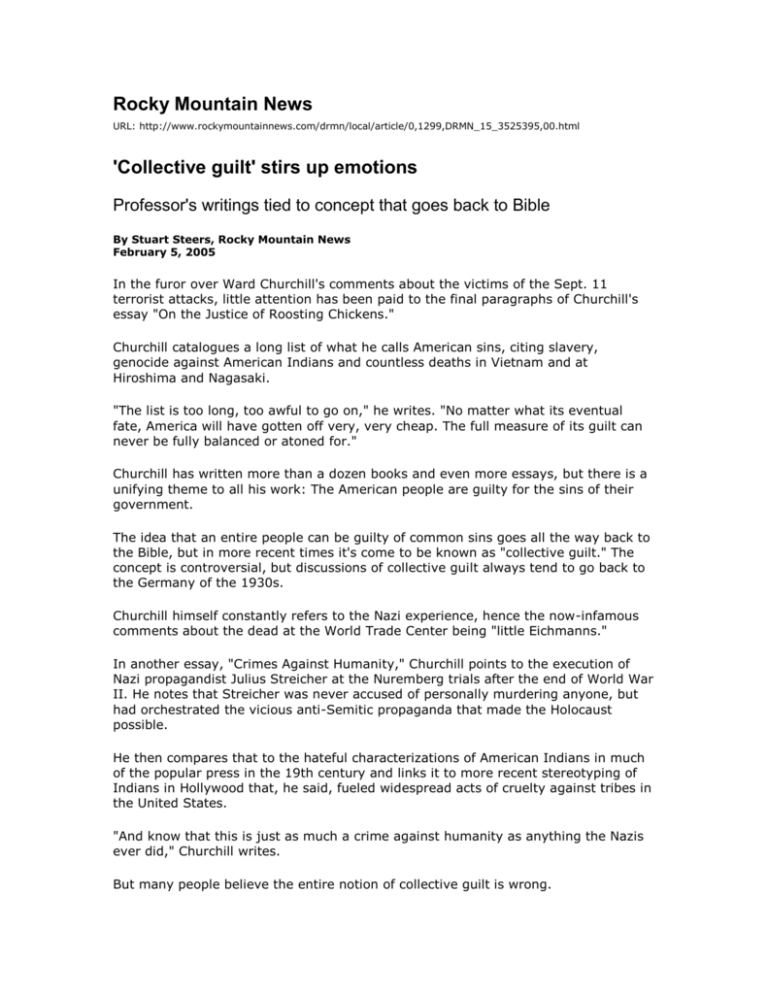
Rocky Mountain News
URL: http://www.rockymountainnews.com/drmn/local/article/0,1299,DRMN_15_3525395,00.html
'Collective guilt' stirs up emotions
Professor's writings tied to concept that goes back to Bible
By Stuart Steers, Rocky Mountain News
February 5, 2005
In the furor over Ward Churchill's comments about the victims of the Sept. 11
terrorist attacks, little attention has been paid to the final paragraphs of Churchill's
essay "On the Justice of Roosting Chickens."
Churchill catalogues a long list of what he calls American sins, citing slavery,
genocide against American Indians and countless deaths in Vietnam and at
Hiroshima and Nagasaki.
"The list is too long, too awful to go on," he writes. "No matter what its eventual
fate, America will have gotten off very, very cheap. The full measure of its guilt can
never be fully balanced or atoned for."
Churchill has written more than a dozen books and even more essays, but there is a
unifying theme to all his work: The American people are guilty for the sins of their
government.
The idea that an entire people can be guilty of common sins goes all the way back to
the Bible, but in more recent times it's come to be known as "collective guilt." The
concept is controversial, but discussions of collective guilt always tend to go back to
the Germany of the 1930s.
Churchill himself constantly refers to the Nazi experience, hence the now-infamous
comments about the dead at the World Trade Center being "little Eichmanns."
In another essay, "Crimes Against Humanity," Churchill points to the execution of
Nazi propagandist Julius Streicher at the Nuremberg trials after the end of World War
II. He notes that Streicher was never accused of personally murdering anyone, but
had orchestrated the vicious anti-Semitic propaganda that made the Holocaust
possible.
He then compares that to the hateful characterizations of American Indians in much
of the popular press in the 19th century and links it to more recent stereotyping of
Indians in Hollywood that, he said, fueled widespread acts of cruelty against tribes in
the United States.
"And know that this is just as much a crime against humanity as anything the Nazis
ever did," Churchill writes.
But many people believe the entire notion of collective guilt is wrong.
"The whole development of European and American law is that there's personal
responsibility," said Professor Robert Schulzinger, who teaches U.S. diplomatic
history at the University of Colorado. "That was the whole idea behind Nuremberg,
identifying the individuals responsible."
Schulzinger believes the idea of collective guilt is inherently racist.
"In Bosnia the Serbs identified all Bosnian Muslims as an enemy that should be
exterminated," he said. "Collective guilt was part of ethnic cleansing. It's very much
at odds with the best tradition of finding out who is and who is not responsible."
Those who survived the Nazi genocide have thought long and hard about collective
guilt as it pertains to the German people.
"The question comes up a lot whenever I speak to students," said Eric Cahn, a
Denver man who survived the Holocaust.
Cahn's German Jewish parents were imprisoned in a holding camp in southern
France, and made the desperate decision to give 4-year-old Eric and his 2-year-old
sister to French Resistance fighters posing as camp workers. His mother died in a
gas chamber at Auschwitz; his father survived but refused to speak about his
experiences in the camp.
"In terms of Germans my age or younger, I have no animosity towards them," said
Cahn, 67. "I do have a lot of animosity and anger towards Germans in their 80s and
90s today who stood by and let the Nazis do what they did. People turned a blind
eye. I do feel collectively they are guilty."
Amitai Etzioni is another Holocaust survivor who has thought deeply about collective
guilt.
Etzioni, a celebrated sociologist who teaches at George Washington University in
Washington D.C., was born in Germany. His parents fled to Palestine in 1935 when
he was six years old. Many of his relatives died in the concentration camps.
Etzioni also believes there is such a thing as collective guilt. He says critics of the
idea, such as Schulzinger, are confusing law with ethics.
"Let's assume you live in a community and know a lynching is going on and do
nothing about it - you are complicit," he said. "There have been a lot of studies that
showed most of the Germans knew what was happening. There was complicity."
As for Churchill's comments about the dead at the World Trade Center, Etzioni
doesn't think vengeance is ever justifiable.
"Killing innocent people is not a way to deal with guilt," he said. "Two wrongs don't
make a right. Even the Nazis got a trial."
steerss@RockyMountainNews.com or 303-892-2282
Copyright 2005, Rocky Mountain News. All Rights Reserved.



